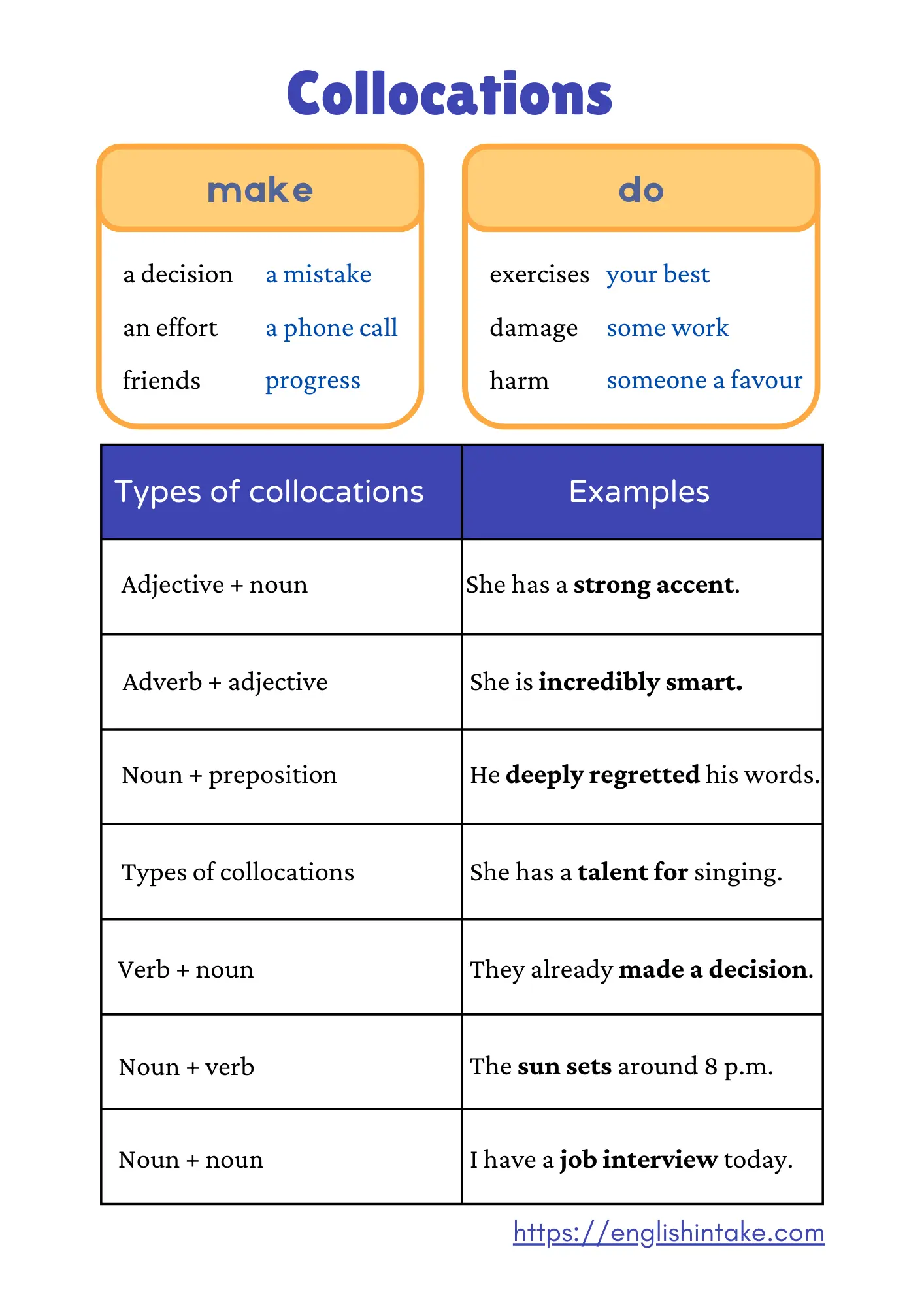1. What are collocations?
Collocations are words that are often used together. For example, we say 'fast food', not 'quick food'. We say 'make a mistake', not 'do a mistake'.
2. Types of collocations
There are 7 main types of collocations in English, including:
- Adjective + noun
- Adverb + adjective
- Adverb + verb
- Noun + preposition
- Verb + noun
- Noun + verb
- Noun + noun

2.1 Adjective + noun
- Heavy rain caused the flood.
- She has a strong accent.
- He offered a sincere apology.
- They enjoyed a delicious meal.
- The golden opportunity was missed.
- She likes fast food.
- The vast majority of people voted for him.
- It’s a common mistake.
- He has a great sense of humor.
- She gave me a quick glance and ran off.
2.2 Adverb + adjective
- She is incredibly smart.
- The film was utterly boring.
- The cake was absolutely delicious.
- He looked extremely tired.
- The test was fairly easy.
- Her style is completely unique.
- She is always busy.
- He is totally wrong.
- The game was rather interesting.
- She acted quite strangely.
2.3 Adverb + verb
- She quickly realised her mistake.
- He firmly believes in justice.
- The police thoroughly inspected the suspect’s house.
- He deeply regretted his words.
- She gently touched the baby’s cheek.
- The teacher clearly explained the topic.
- I fully understand your concern.
- The fans eagerly awaited the concert.
- She happily accepted the offer.
- I badly need money.
2.4 Noun + preposition
- There is a need for more rigorous security measures in the city.
- She has no desire to be with him again.
- There’s a ban on smoking here.
- She has a talent for singing.
- There’s a demand for organic products.
- I have a passion for art.
- They showed a lack of interest.
- The key to success is hard work.
- I have a fear of heights.
- There was no reason for the police to kill the suspect.
2.5 Verb + noun
- The police finally gained control of the gang.
- They made a decision to move abroad.
- He never pays attention to what I say.
- The presence of the military has brought stability to the region.
- It was my lawyer who drew up the contract for me.
- The committee will reach a verdict tomorrow.
- She offered an apology for her behavior.
- The government should take measures to control pollution.
- The organization provides assistance to the needy.
- The artist gained recognition for his unique style.
2.6 Noun + verb
- Every year, many opportutinies arise for individuals selling handmade crafts during the holiday season.
- My heart beats faster whenever I see her.
- Every morning, birds sing outside my window.
- The cat purrs contentedly on my lap.
- The bells ring every hour in the old church tower.
- Rain falls gently on the rooftop.
- The wind howls through the trees last night.
- The fire burns brightly, keeping us warm.
- Water boils at 100°C (212°F) at sea level.
- My car broke down on the way to the meeting.
2.7 Noun + noun
- Do you like action movie?
- The professor presented a case study on urban development during today’s lecture.
- We usually have a morning coffee break around 10 am.
- We all have a mix of personality traits.
- They are creating a business plan for their new startup.
- The police arrested a sex offender yesterday.
- Many countries have made significant strides in promoting gender equality in the workplace.
- He was convicted of war crime.
- The school system in Finland is highly regarded.
- There was a surge of interest in environmental issues after the documentary aired.
3. Common use of collocations in English
- Daily activities: We often use collocations to describe our routines. For example, we brush our teeth in the morning and go to bed at night.
- Business English: In the business world, there are many specific collocations. People might launch a product, hold a meeting, or close a deal.
- Social interactions: When we chat with friends, we might pay someone a compliment, make small talk, or give someone advice.
- Food and restaurant: When discussing food, we often use collocations such as have a meal, cook dinner, or eat out.
- Emotions and feelings: We can use collocations to describe how we feel. We fall in love, burst into tears, or have a great time.
4. Common mistakes while using collocations
Students often translate collocations from their native language into English. For example, in french, we say mettre la table, which would literally be translated to English as put the table. However, the correct English collocation is set the table.
Another common mistake is the overuse or mixing of verbs like do, make, and get.
| Incorrect | Correct |
|---|---|
| do an effort | make an effort |
| do a mistake | make a mistake |
| make research | do research |
| make a party | have a party |
| get friends | make friends |
